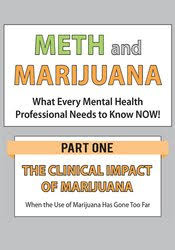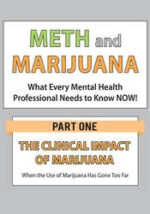But it harms those far beyond the nearly half-million Americans that use meth each week. Families are neglected, children are exposed, and the prison system is overrun. It’s everyone’s problem.
Hayden Center – The Meth Epidemic, What Every Clinician Needs to Know
Dangerously addictive, meth is a drug that ends lives. It’s literally a substance so volatile it puts holes in the human brain.
But it harms those far beyond the nearly half-million Americans that use meth each week. Families are neglected, children are exposed, and the prison system is overrun. It’s everyone’s problem.
As the tentacles of this sinister epidemic spread into our communities, you need to be prepared to address issues related to methamphetamine and other stimulant drug use in your clients’ who use and in your clients’ who have a drug user in their lives!
Whether you’re an addictions professional, social worker, counselor, psychologist or nurse, this recording will give you the critical information you need to:
Understand the impact of co-occurring disorders with meth use on treatment outcomes
Work more effectively with clients that struggle with a dependency on meth
Be prepared for future trends and next steps in dealing with the meth epidemic
Make sure that you can be part of the solution to one of the scariest epidemics facing our communities today!
Characterize how the addictive properties and physical impacts of methamphetamine on the body and how this information informs treatment approach.
Detail how other mental health disorders can negatively impact treatment and articulate how clinicians can employ techniques to combat this obstacle.
Communicate how clinicians can assess ongoing methamphetamine use treatment to evaluate effectiveness, and outline steps that can be taken to modify treatment when needed.
Articulate how screening tools can be used with methamphetamine use disorder clients to identify co-occurring disorders that can negatively impact treatment outcomes.
OVERVIEW OF METHAMPHETAMINE
Prevalence of meth use
How meth is produced
Typical cycle of dependence
THE IMPACT OF METHAMPHETAMINE USE DISORDER ON THE BRAIN
Brain centers – the relationship between brain centers
The pleasure factor and the addicted brain
Differences from other substance use disorders
How chronic meth use changes the brain
PSYCHOTHERAPEUTIC APPROACHES TO TREAT METHAMPHETAMINE USE DISORDER
Signs of meth use disorder and questions to ask
CBT – recent studies
Motivational Interviewing and Motivational Enhancement Therapy
Contingency management
The Matrix Model
12-step counseling
Family counseling
Adjunct approaches – including smart phone daily prompts
Assessing and modifying treatment to ensure effectiveness
Research limitations and risks of psychotherapeutic approaches
Would you like to receive Hayden Center – The Meth Epidemic, What Every Clinician Needs to Know ?
IDENTIFY AND TREAT CO-OCCURRING DISORDERS WHEN METH IS INVOLVED
The impact of co-occurring disorders on treatment outcomes
Primary disorders vs. substance-induced co-occurring disorders
Screening procedures and tools
Questions to ask
Recording results
Safety issues
Trauma history
Validity in co-occurring treatment research
Risks associated with co-occurring treatment options
MEDICATION ASSISTED TREATMENT (MAT)
Medications that are being used in current trials
Limitations of research and potential treatment risks
ROUTES TO PREVENTION: SETTING THE STAGE FOR FUTURE SUCCESS
Community-level approaches to prevention of meth use
Prevention approaches at the individual level
Relapse techniques








